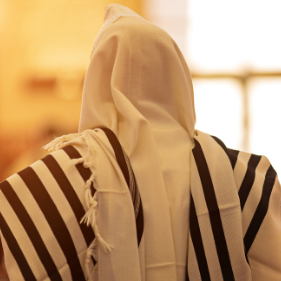‘Hillel welcomed me with open arms’

Rabbi Rebecca Blady narrowly escaped a massacre last Yom Kippur.
The synagogue was filled with 50-some worshippers on Oct. 9 when a shooter, unable to breach the wooden door, killed two passersby in the small community of Halle, Germany. Rabbi Blady was praying inside with her family and 20 Hillel participants, many of whom have testified in the trial against the accused gunman.
One year later, her commitment to fostering community for young German Jews has only grown stronger, said Rabbi Blady, who serves as executive director of Hillel Germany.
“This has been a year of uncertainty for our community,” she said. “We are committed to coming together as a community on the first anniversary of Halle and forging a path forward, one that is rooted in compassion, resilience and Jewish values.”
As the season of repentance approaches, students and professionals from Hillel Germany are preparing for a first: hosting their own Yom Kippur services. The program is part of the “Festival of Resilience,” a five-part series organized by Hillel Germany and Base Berlin, an initiative of Hillel International supported by Genesis Philanthropy Group.
Yom Kippur services will be woven with original rituals to inspire communal healing and education for students. Attendees will pause their service in between the second and third Torah reading, when the attack began in Halle, to express kavanah, Hebrew for intention and direction. There will also be time to share words of gratitude during the Musaf service, remembering how captive congregants kept praying in lockdown.
Rabbi Blady said these rituals can provide comfort as the German Jewish community acknowledges a collective trauma on the first anniversary of the shooting. Just as one cannot ignore the shadow of trauma in Germany — the origin of Holocaust history — one cannot ignore the emotional scars from the Halle attack, she added.
“What we’re hoping to do is acknowledge the trauma,” she said. “We all experienced this attack differently. Some have testified against the Halle attacker in court, including myself, to give voice to our experiences. Some weren’t at the Halle synagogue, and are still processing this tragedy.”
Because praying together on the shooting anniversary may spur feelings of sadness or fear, a social worker from OFEK, a counseling service for antisemitism victims, will be present. Attendees are encouraged to stop davening and speak with her as needed. A security guard will also attend the services.
Paul Stier, a 21-year-old student, was originally hesitant to attend services with Hillel Germany because he wanted to give Halle survivors, some of whom are close friends, an intimate space to grieve. He changed his mind after realizing the value of resilience at Hillel Germany, a place he describes as a vibrant hub for young, pluralistic Judaism.
“Coming together as a community to observe Yom Kippur is an act of resilience,” said Stier, a history and Jewish studies major at Freie Universität Berlin. “It shows that Jewish people are still here in Germany and we will continue to be here.”
To ensure safety amid the coronavirus pandemic, worshippers are required to wear masks and remain 6 feet apart. Each of the 50 available seats have already been reserved by students and young adults, including 10 of whom are survivors of the Halle tragedy. Rabbi Blady also has contact information on file for each registered person in case she needs to notify them of possible coronavirus exposure.
Although the pandemic adds another layer of anxiety to Yom Kippur, student Jessica Mescheritzki said she recognizes the importance of spending the holiday with her peers.
The 21-year-old said she has been plagued by guilt for observing last Yom Kippur with friends roughly 250 miles away instead of at the Halle synagogue, where she grew up attending Hebrew school and holiday programs. That was the first time she didn’t spend Yom Kippur in Halle.
Mescheritzki, who studies communication science at the University of Twente, connected with Hillel Germany two days after the shooting.
“When I moved to Berlin three months ago for an internship, Hillel welcomed me with open arms and helped me process the attack,” Mescheritzki said. “I don’t know where I would be mentally if it wasn’t for the vulnerability of my Hillel community.”
Adam Lehman, president and CEO of Hillel International, said the actions of Hillel participants and professionals in Germany are a testament to Jewish resilience in the face of adversity.
“Those who experienced the unimaginable in Halle continue to transform that horror into profound Jewish moments despite the challenges we’re all facing,” Lehman said. “May all of us be inspired by their determination and perseverance.”